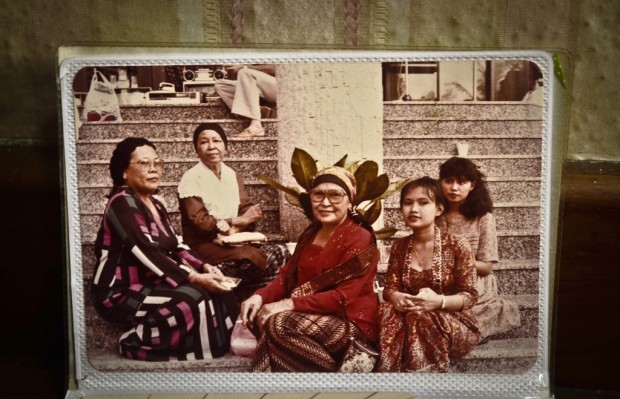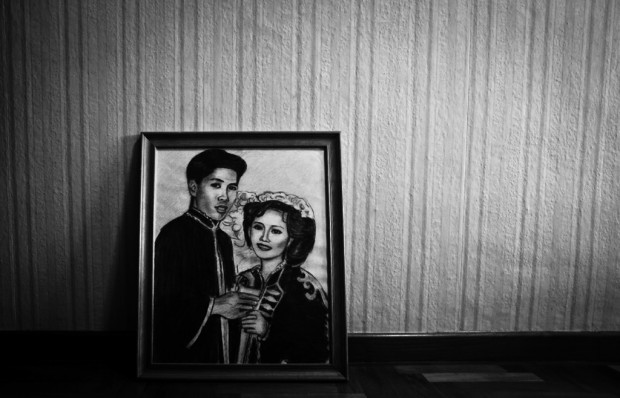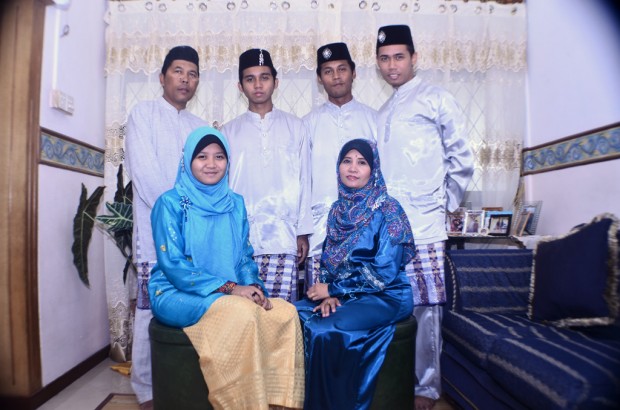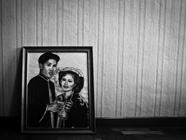“Dear diary. Please excuse my writing. I can’t stop my hands from shaking. Because I’m cold, and alone tonight… I don’t know the language. I don’t know the people. I don’t even know my own husband. All I know is his name, and this ring on my left ring finger that binds me with him…”
These words, scrawled in Bahasa Indonesia in a browned diary, belong to Madam Sunemah Palok. It wasn’t easy, she says, to live in a country where you barely knew anybody. She closes her eyes, playing in her mind the last remaining bits of her childhood that still linger in her memory. Among the sea of old photographs and other physical reminders she owns, the diary is the one that holds the thoughts of her early days living in Singapore. She says: “Imagine going to a country where you barely know the culture, hardly speak the language, and scarcely know anybody. One moment I was walking home from school, then the next thing I remember, sitting down inside a ferry; my old life in the form of my luggage and my new life awaits in the form of an island called Singapore.”

The concept of arranged-marriage may be outdated today, but for underprivileged families it is a way to break out of the poverty cycle. Born in Tanjung Pinang on 6th June 1968, located in the outskirts of western Indonesia (beside Batam), the 45-year-old Madam Sunemah led a nomadic life. She was brought up in two separate families, travelling from Kawal to Tanjung Gat from one rural area of Tanjung Pinang to another, while balancing housework and being a domestic helper all before she turned 16. Her parents, Mr Palok, who work as a farmer by day and teaches Al-Quran (the Holy Book of Islam) by night, and Madam Salmah, a housewife, were too poor to provide for her and her seven siblings. Seeing her siblings moved away one by one, passed on from one foster family to the next was, sadly, a common sight. Then, at an age where girls in Singapore would be tearing their hair over which top to match with their new Mary Janes, Madam Sunemah’s dilemma was whether to accept a marriage proposal. In her case, that proposal came in the year 1986 from a Singapore man.

“No I wasn’t forced,” she says. “Sharing was all I knew. From stationery to basic necessities, we were too poor to own anything ourselves. So when it came to marriage, I was obliged to accept, even at 17. Because when you are poor, you can’t control where you want to go and what you want to do.”
Writing was her only solace during her difficult first few years living in Singapore. Everything happened so fast. From the marriage to crossing international waters before reaching Singapore shores, she had barely spoken a word to the stranger she suddenly had to call her husband.
“I arrived on the basis of a social visit, so I wasn’t allowed to have a job,” she recounts. “After living for 17 years working, it felt strange to be free. I wanted to do something but I was too afraid to ask. These people (her husband and her in-laws) were still strangers in my eyes. I was just 17. What do you expect a 17 year-old-girl to do?“
It was three years before Madam Sunemah and her husband, Mr Slamat Satam, finally got their permanent resident (PR) status.
Mr Slamat recalls: “Every time we applied (for PR), we got rejected. I’d just started working as a mechanic at that time and my pay was deemed too low to support my wife. The paperwork (marriage registration, residency and housing application), plus the waiting was troublesome. I remember sleeping outside the ICA (Immigration and Checkpoint Authority) building just to be the first in line to apply for my wife’s residency.”
This also caused a delay in their plans to start a family. “Imagine if we had a child whilst still undergoing the process of getting residency…if the application is still not approved our child would be stateless,” Mr Slamat explains.
Madam Sunemah’s first child was born in 1989. Then, Mr Slamat, Madam Sunemah and their newborn child lived in a modest three-room HDB flat in Clementi. While her husband was away for work, she helped her children with their homework all by herself.
Madam Sunemah’s second child Safwan is full of awe for his mother. Currently pursuing a degree in hospitality, the 23-year-old says: “When I was in Primary 1 our routine after school was simple – do homework, pray, recite the holy Al-Quran, then revise. Imagine, someone who didn’t finish her primary education taught us English, Math and Science. She spoke no English, yet still managed to find financial assistance, go around the town market and now even has a driving licence. All on her own. No help. I still wonder how she does it sometimes.”
Her children’s admiration for her is a reflection of the lengths a mother would go to bring up her children. Salihin, 18, the third of the four siblings, perhaps fittingly, puts things into perspective.
“God is fair,” he says. “When you lack something, you will be compensated with another. Looking back, I guess every one of us (siblings) was given the gift that defines my mother – being independent. We took it upon ourselves to learn English and Maths in school. So when we get home, we will share as much as we can with her, and being a fast learner, she probably picked up the language, though broken and basic, and everything else is just a mother’s natural instinct from that point on.”

Today, Madam Sunemah lives in a comfortable four-room apartment in Bukit Panjang and will be celebrating her 27th wedding anniversary with Mr Slamat. She spends her time cooking and sometimes helping out her friend at a canteen stall in a neighbourhood secondary school. Her three sons are now studying at tertiary level, with the youngest of the three soon to be enlisted for National Service. Shahirah, 16, is the youngest child and the “princess” of the four children.
“Because she is the only girl, I have to treat her a little differently than her brothers. Yes, once in a while the brothers ‘mata merah’ (jealous) of her, but I am thankful they never show it,” says Madam Sunemah.
After taking one last look at the diary that served her well during her initial days of struggling to adapt to life in Singapore, the loving mother shares one last secret.
“My eldest son snores. One time, during his rebellious teen phase, he ran out of the house and didn’t return for two days. I couldn’t sleep. Even after he returned and got a good beating from his father, I couldn’t sleep. Why? I am so used to his snores that I can’t sleep without hearing it. Those two nights were the most difficult nights in my life. The irony, right?” she says with a wry smile, without the slightest hint of an Indonesian accent.
This is an edited version of an article written by a final-year Diploma in Mass Communication student for a feature writing assignment in August 2013.





